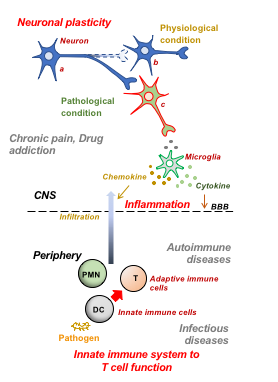Information about the Inoue Laboratory.
 The infiltration of peripheral immune cells into the central nervous system (CNS) is critical for the development of neurodegenerative diseases such as multiple sclerosis (MS), which is a debilitating chronic disease of the CNS. Being a heterogeneous complex disease, our current understanding of MS development and its underlying neuroimmune interactions is incomplete, leaving many critical, urgent questions in the field of MS unanswered, such as how neurological degeneration is induced in progressive MS, how MS phenotype switches from remitting type to progressive neurodegenerative type, and how to best prevent and treat it.
The infiltration of peripheral immune cells into the central nervous system (CNS) is critical for the development of neurodegenerative diseases such as multiple sclerosis (MS), which is a debilitating chronic disease of the CNS. Being a heterogeneous complex disease, our current understanding of MS development and its underlying neuroimmune interactions is incomplete, leaving many critical, urgent questions in the field of MS unanswered, such as how neurological degeneration is induced in progressive MS, how MS phenotype switches from remitting type to progressive neurodegenerative type, and how to best prevent and treat it.
Cryptococcus-associated immune reconstitution inflammatory syndrome (C-IRIS) impacts immunocompromised individuals who recently recovered from immunosuppression, such as immunocompromised patients who received solid-organ transplants, HIV patients who underwent antiretroviral theory, MS patient who discontinued immunosuppressive Natalizumab, and even post-partum women. C-IRIS is becoming a major problem in the management of many clinical conditions. A common pathological feature of human patients with C-IRIS is a chronic pulmonary disease, lesions, and edema in the brain, as well as a high number of CD4+ T cells and upregulation of pro-inflammatory cytokines. Despite these clinical complications, the underlying mechanisms of these pathological manifestations are largely unknown.
In our lab, we study the neuroimmune mechanism of MS using unique mouse models in the context of disease contributing factors such as stress, steroid hormone imbalance, and aging. Projects to identify key signaling pathways for the development of C-IRIS is also on-going using newly developed mouse model. The goal of these studies is to fine-tune our understanding of the distinct disease immunopathogenesis of MS reflected by corresponding distinct disease phenotypes, and C-IRIS. The long-term goal of these projects is to contribute to the development of novel and effective therapeutic protocols for disease treatment.
Our Principal Investigator is Makoto Inoue.
Check out our website here.